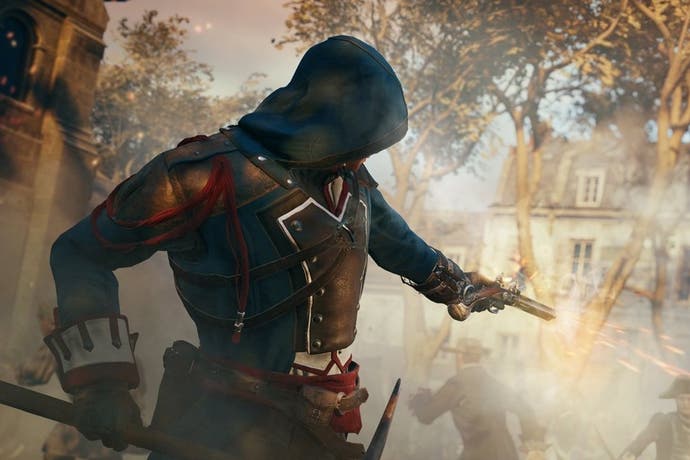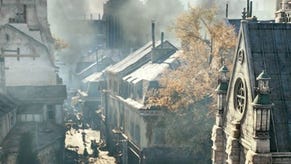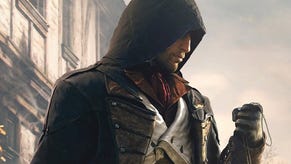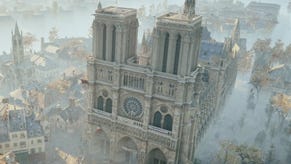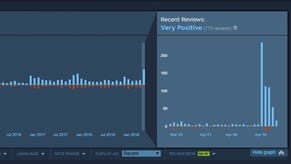Assassin's Creed: Unity takes a daring leap back to the series' origins
A regime change well executed?
Do you remember the original Assassin's Creed? Masyaf in the summertime, Altair being a bit of a dick, the revelation you were actually a bartender schmuck named Desmond? Seven years on and countless games later it feels a good time to look back at Ubisoft's original take on the franchise - its first draft of the series' formula - because of the similarities in how Assassin's Creed: Unity is now shaping up to be.
Unity is being billed as something of a series reboot, free of any story baggage that might bother Assassin's Creed newbies. Haven't slogged through the entire series so far? Ubisoft is keen to reassure lapsed fans or complete newcomers that you won't have had to. And then there's also the matter of Unity's two biggest gameplay changes - tweaked traversal controls that allow you to parkour more accurately, and a co-op option so three friends can join your Parisian adventures at pretty much any point.
At the same time, Unity's return to more open-ended assassinations as well as its focus on missions identifying and tracking major story targets all seem something of a throwback to the series' origins. And after several years spent earning our sea legs on the Aquila and Jackdaw, Unity's return to dry land and its focus on a single city feels something of a backstep. But these revisions to the formula are deliberate choices on Ubisoft's part, an attempt to realign the series to its original promise - of an open world with social stealth mechanics, smooth traversal and engaging combat.
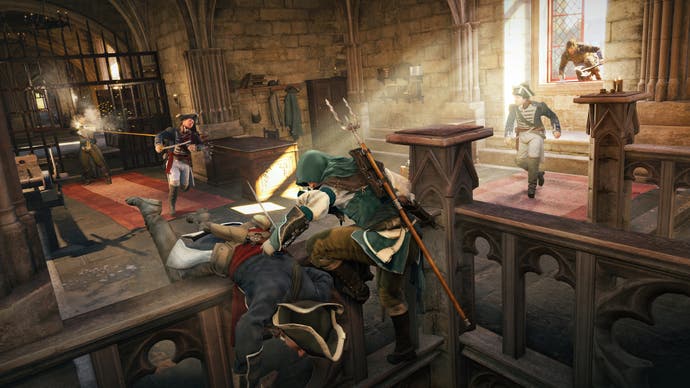
"Our goal with Unity - and we started working on this before Black Flag existed - was always to do that," creative director Alex Amancio tells Eurogamer regarding Unity's changes. "But instead of doing it with a satellite feature like a ship, to do that with the core game. You could think of Paris as our Caribbean, but instead of mini-games and ship-based stuff, it is now all about finding new stories, new missions. The main loop in Black Flag was to upgrade your ship. Arno is your ship in Unity."
It's all about Arno, Amancio stresses - Unity is his story, his progression from novice to master, and it's through his eyes that we'll be reintroduced to some of the series' core concepts. Raised amongst the shadowy Templar order, Arno will slowly learn the truth about his origins and find himself joining the Assassins, all the while realising there is something he can't leave behind - the fact that he is in love with his childhood friend Elise, who becomes in adulthood something of a Templar rival.
But the details of Arno's story remain largely under wraps. We were shown a much earlier portion of the game, where Arno is still learning his trade and trying to overcome a family tragedy. There are shades of Ezio's journey for revenge to be found in Unity's early sequences, as Arno hunts those responsible for the murder of his adoptive father. Against the backdrop of the French Revolution and amongst the stones of some of Paris' most famous landmarks, you are given specific targets to track and assassinate in a search for more information. The exact mechanics of how you do so are left up to your choosing. All will likely end with you sticking something sharp in your target's neck, but it's in the getting to that point where Unity offers more choice.
Locations are, a little like Hitman, presented as puzzles with multiple routes. Overhear dialogue about a band of nearby beggars in trouble? Go save them and they become your allies, suddenly enabling you to take on groups of guards in larger numbers. Bump into someone who mentions they've lost their keys? Retrace their steps and pick up the keys for them, then slip into your target's location unnoticed via a locked back exit. Some of these clues are missable, some more obvious. One example I liked was the ability to block the chimneys in one location, flooding the catacombs below with smoke to aid my escape.
Missions themselves are more tactical, and the new combat and exploration controls are an important part of this. You can finally crouch manually (hold the L trigger) and lock into cover with a tap of the A button. If you're spotted by a guard you'll see an outline of your last known position on screen, better informing you of where you might be slipping up but also giving you the opportunity to deliberately gain their attention before sneaking away and flanking your attackers. The R trigger is still your command for parkouring up and over objects and buildings, but the addition of the A (for up) and B (for down) buttons mean you can better inform the game exactly where you want to go. There are fewer slip ups, and less accidental jumps off 200ft towers into a sprawling, desynchronised heap on the ground.
Combat has been made a little harder - at any rate, enemies feel like they have more health, but the parry button is still there and the reintroduction of health packs allows you to still stand and batter someone for quite some time until they finally, finally submit and die. The best that can probably be said about Unity's combat is that it has finally become more attractive to avoid it - due to how unfun and slow actual combat can be compared to stealthy, quick kills that let you move on undetected, but also due to the new enhancements in stealth bonuses that you can now acquire.
Unity doesn't have a skill tree as such, but does have several menus of new abilities you can pick and choose from to learn in the order you choose. There are four specialisations - Ranged, Heavy, Melee and Health - and along with the vast number of new armour options allow you to tailor your version of Arno to your own specific strengths. Hundreds of hoods, cloaks, boots, gloves, one-handed weapons, ranged weapons, upgrades and perks are available for you to pick from. There's also a new type of power, Active Skills, which influences your assassin when playing in co-op. You can select from Group Heal, Share Eagle Vision and Disguise - all fairly self-explanatory, or be able to generate an Assassin Cache full of consumables to keep your fellow Brotherhood bros fully stocked.
Co-op itself can be initiated at almost any time, and extends from casual free-roam over the game's map to you taking part in specific missions (although nothing is locked out if you simply want to play by yourself). Two-players can be fun although four can feel a little challenging if you're trying to keep everyone out of sight. Quadruple the number of Assassins in a location is problematic when trying to remain hidden, although in practice you also have three other players around you to help mop up your mistakes.
Of course, it will take some time to build Arno up into a formidable force - and you'll have to contend with no less than four types of currency/upgrade points when doing so. There are Sync Points, awarded through story progression and which you can use in the aforementioned skill menu to unlock new abilities. Then there are Francs, your general currency, used to buy equipment and consumables. New to the series are Creed Points, earned by successfully performing Assassin actions such as silent kills, double takedowns and after you stealthy parkour down from great heights.
Finally there are Hack Points, a shortcut currency set to be purchasable via micro-transactions. The mechanics for buying these weren't live in the build we played (and there were no example prices listed), but after looking through the game's menus we found a screen with five different Hack Point pack types seemingly ready to go on sale. The currency will allow quicker access to certain weapons and gear items, and while micro-transactions aren't entirely new to the series (Black Flag included time-saver packs to unlock map icons and ship upgrades) the progression to a full, alternate in-game currency is a step further than what has gone before.
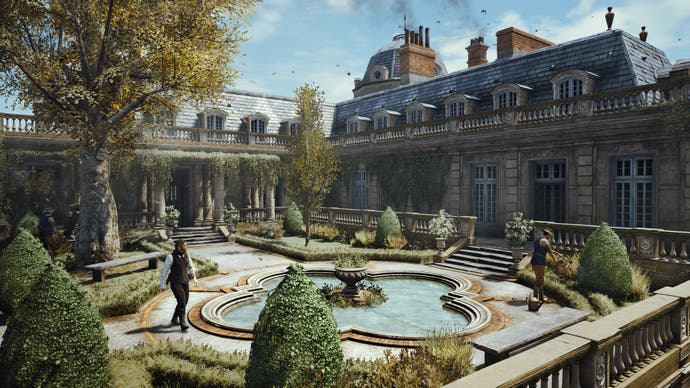
Beyond the main missions and new features, Unity is still very much an Assassin's Creed game. You unlock missions in different districts by acquiring a bureau in each - a Café-Theatre - which operates in a similar way to the Borgia Towers of old. Upgrade each local office and you'll unlock more missions in the area while slowly pacifying the local guards and Parisian militia. And of course there are side-missions aplenty - "hundreds" of Assassin contracts, Murder Mysteries where you can condemn and lock up suspects, Treasure Hunts to find clues left by Nostradamus and the usual sprinkling of collectibles.
It sounds like a big game, and as you would expect from Ubisoft, it is. In terms of size, the map is bigger than all of Black Flag's land masses joined together. Cramming all of the content in and polishing it up is now where the company is focusing. Unity still needs polish and an awful lot of it, if the amount of bugs we experienced in the preview build were anything to go by. We saw multiple building textures not popping in until we had climbed one side of a house and were already running across its roof. Then there were the falling bugs which caused you to plunge through the floor or become snagged and stuck, floating with jazz hands in thin air. And there were cut-scenes where the speech still needed to be properly lip-synched. There is still time to work on all of this - I'm guessing Ubisoft is willing to recruit most of Canada for the six or so weeks left before launch to get all of this done, but yet again it feels like another Assassin's Creed game that could have done with another few months to iron out all the wrinkles. It'll be very interesting to see the size of Unity's day one patch.
"The old cycle is finished. The Kenway saga is finished. This is really the start of what's to come for this new current-gen," Amancio concludes. As the first taste of what Assassin's Creed will be like for the next few years, Unity is a promising first step. But, like Assassin's Creed 1, it feels like another Ubisoft formula still in need of some refining. Unity launches a year after the latest round of consoles, just as the franchise's original entry launched a year after the PlayStation 3. There are definite improvements to go along with the new hardware, but by going back to the series' basics Unity can sometimes feel like too much of a starting take on what the series will continue on to be.
This article is based on a press trip to Paris. Ubisoft paid for travel and accommodation.
